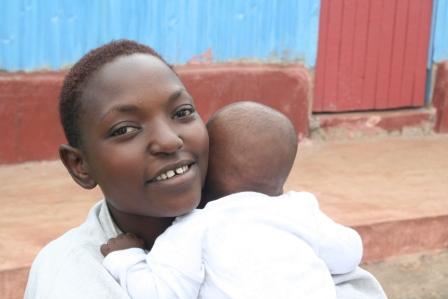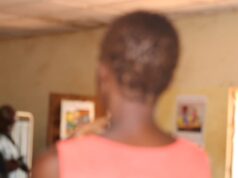21 year-old Valerie Kasaya is 5 foot tall. While attending her antenatal clinics, the nurses had told her that there was no way she was going to give birth naturally. Reason? She was too short. They were blunt like that. Well, Valerie’s mother could hear none of that, and she decided to take her daughter to a different health center where she would be encouraged to try have a vaginal birth first, and if not, then a c-section.
When labor came, Valerie trekked to a little health facility in Kawangware called FreMo clinic and with the help of a midwife, she safely delivered a healthy 3.1kg baby. It only took four hours of labor. Valerie did not have any complications, no episiotomy, no nothing. It was a smooth delivery for this first-time mother.

It is encouraging to know that is possible for short women to give birth vaginally. A short woman should not automatically be written off for vaginal delivery purely on the basis of her height. Valerie is one such example. She and her son, who is now eight months old continue to enjoy robust health.
However, in some cases, there are short women who are not able to have vaginal deliveries. And in the same breath, there are also big women who cannot give birth naturally. Height is not the sole determinant for this. I spoke to Dr. Stephen Mutiso, a consultant obstetrician / gynaecologist who explained it to me very well. According to him, a diagnosis of cephalo-pelvic disproportion (CPD) is what determines if any woman –whether short or tall, will give birth naturally or via caesarean section. Cephalo refers to the size of the baby’s head, and pelvic means the size of the birth passage. A diagnosis of CPD means that either the baby’s head is too big for the woman’s pelvis, or the pelvis is too small for a normal sized baby. In women diagnosed with CPD, natural delivery is difficult and at times impossible.

“Small women tend to have a small pelvis, and are likely to have difficulties during delivery. Any woman with a small pelvis and whose baby indicates being slightly bigger compared to her pelvis is not advised to try normal delivery,” he says.
Also Read: Is There any Harm in Pregnant Women Eating Stones and other non-food Items?
However, Dr. Mutiso clarifies that there are short women who have small babies and go on to have successful normal deliveries, and that is why it is important for the doctor, nurse or the health professional attending to the pregnant woman to do a proper assessment –during pregnancy or when labour begins. This assessment helps determine if the pelvis is adequate enough to allow baby to pass through. If the baby’s size is small to average, then labour should be considered.

For women who insist on pushing a baby that cannot pass through a small pelvis, Dr. Mutiso warns of the consequences.
“This could lead to prolonged labor and cause obstruction, which in turn may result in complications such as fistula, rupture of the uterus, serious infection, foetal distress and excessive bleeding after birth. In some instances both mother and baby may die.”
He goes on to say that in the event vaginal delivery goes on to take place, the mother can sustain serious perineal tears or cause damage to her reproductive organs. Further, caesarean deliveries done when one has been trying to push are more difficult and associated with increased complications.
Also Read: Warning Signs in Pregnancy: When to Call Your Doctor
So, in as much as most pregnant women plan to delivery naturally, it is important to understand that complications may arise during labour, and which may necessitate a caesarean section. These complications include; failure for labor to progress despite good contractions, foetal distress and excessive bleeding.
The good thing to know though is that there are short women who can have natural births, Valerie being a good example. But, be adequately informed about the same. Knowledge is power. Talk to your doctor, and make sure a proper assessment is done. If are certified to do so, then is all good, but do not insist on trying to do something that may cause you or your baby dire consequences.
Also Read: What Foods Should a Pregnant Woman Eat? What about Liver?
Keep updated with latest posts by following Mummy Tales on: FACEBOOK l INSTAGRAM l TWITTER
Part article credit: The Star








































I believe we were all created wonderfully (perfectly) and all good things are possible when the mind and the body have not been corrupted by fear and poor diet. Well done to Valerie and her baby.